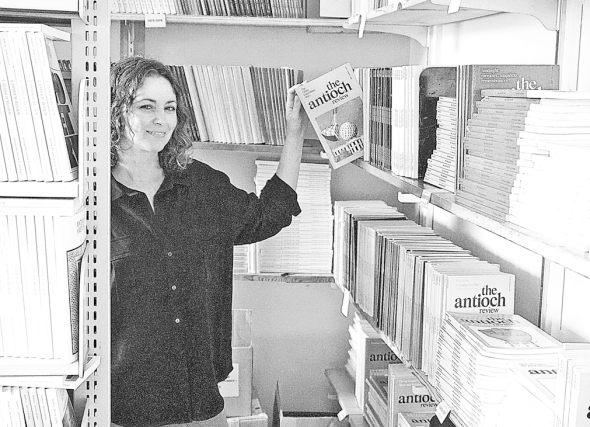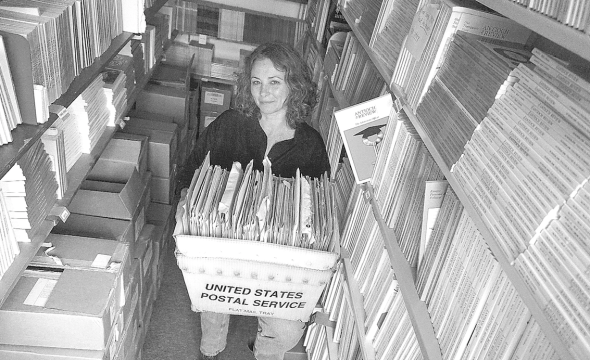
In recent weeks, Antioch professor of writing and aesthetics Brooke Bryan has begun the work of reviving some much beloved literary institutions: the Antioch Review as well as the Writers’ Workshop. The first, re-inaugural workshop will be held at Antioch’s campus July 8–12. (Photo by Reilly Dixon)
The Antioch Review and Writers’ Workshop to be revived
- Published: June 4, 2024
Antioch College is returning to its literary roots.
After a four-year hiatus, the Antioch Review — the college’s independent literary magazine founded in 1941 — is set to emerge from its publishing pause, now with a new editorial vision and business model that includes the simultaneous revival of the Antioch Writers’ Workshop.
Heralding these efforts is Antioch associate professor of writing and aesthetics Brooke Blackmon Bryan, who, for now, is managing editor of the Review and director of the Writers’ Workshop.
“I’m here to build it and make it all work,” Bryan said in a recent interview from the Review’s offices on the second floor of Antioch’s Olive Kettering Library. “We’re in an experimental phase, but I think there’s a certain logic in entangling the Review with the workshops. They can support one another and be mutually sustaining.”
Whereas the next print edition of the Review may not be published until 2025 — an “aspirational date,” as Bryan put it — a week-long Writers’ Workshop will be held at Antioch’s campus July 8–12. It’s the first since 2019.
The five-day workshop will consist of morning seminars, afternoon author meetings, writing practices and other literary events. Featured writers include Kashmiri novelist Feroz Rather and Yellow Springs-based authors Rebecca Kuder and Robin Littell. Participants have the options of residing on or commuting to campus for the duration of the program, or getting a “day pass” to attend just one or several days of the program.
“I have these visions of writers under a tree, on a campus bench or coming out of the Glen with a manuscript in hand,” Bryan said. “This is Antioch engaging with a bigger literary community that’s grounded here in Yellow Springs, which has always been a destination for intellectual ways of being.”
True to its name, the Antioch Writers’ Workshop originated at the college in 1986 as a summer program, serving and fostering writers of poetry, fiction and nonfiction. It became an independent nonprofit in 1991, and after years in the village — including in partnership with Antioch University Midwest — the workshop relocated its base of operations to the University of Dayton in 2017. Programming ceased altogether two years later owing to financial instability, as previously reported in the News.
Luminaries such as Joyce Carol Oates, Nikki Giovani and Roxane Gay are just some of the literary giants who taught or spoke at past workshops.
According to a recent press release from Antioch, AWW’s return home will directly contribute to the Review’s eventual print revival; it is “the first step toward a sustainable business model that imagines connectivity among the editorial board, annual workshop talent and emerging and established writers featured in future editions of the Review, grounded in the justice-focused mission of the college,” the statement read.
Though Bryan was unable to provide the News the Review’s — and by extension, AWW’s — budget, she noted that the college’s renewed focus on these programs is in line with Antioch’s most recent strategic plan to “diversify revenue streams” through its “learning hubs,” which, in addition to the Review, include the college farm, Coretta Scott King Center, the campus store or (C-Shop) in the library, Foundry Theater, Wellness Center and Herndon Art Gallery.
“The idea is that these things are supportive of student experience at a ‘work-college’ like this one,” Bryan said.
To that point, Bryan said Antioch students will have an active role in the Review’s revival as submission readers and helping to produce and edit the magazine. Presently, Bryan oversees one student on a full-time co-op with the Review, whose main job is helping Bryan sift through and log the many hundreds of submissions in the “slush pile” that accumulated in the years since the hiatus.

Brooke Bryan stood among the immense Antioch Review archives holding a portion of the magazine’s “slush pile” — submissions that have accumulated over the last several years. (Photo by Reilly Dixon)
“The feedback loops students give can really benefit the Review — not just organizationally and in its structure, but I imagine you’ll see that shine through in its eventual content,” Bryan said.
Presently, there are 126 students enrolled at Antioch.
A heavier student involvement in the Review isn’t the only organizational change to come; Bryan said that while she is presently the magazine’s managing editor, she aims to establish a “rotating” board of guest editors — one that would be intertwined with a future advisory board for the AWW.
“I want to work and connect with people who are able to catalyze a very specific conversation which can give us a thematic purpose,” Bryan said. “I’m interested in global perspectives.”
This rotating editorial board model is a departure from the Review’s most recent iteration: Bob Fogarty was the magazine’s lead editor since 1977. When he was furloughed amid the COVID-19 pandemic in 2020, the Review ceased operations. Fogarty died in 2021.
“Fogarty was very successful in establishing an innovative editorial style,” Bryan said of her predecessor. “Through his decades, he was able to chart some major American literary movements. He was well-known for identifying emerging talent.”
She added: “The Review has, since it began, published some renowned and recognizable authors — and at the same time, also a lot of new writers who went on to have illustrious intellectual careers. To me, that’s a big deal.”
Since its establishment over 80 years ago, the Review has featured the voices of novelists, essayists, poets, short story writers, cultural critics and others in its storied pages. Famed writers such as Ralph Ellison, Sylvia Plath, Leon E. Panetta, Theodore Peterson, Ha Jin and Aimee Bender — to name just a few — have appeared in the publication.
As Fogarty told the News in a 2017 interview, the Review’s originators — all of whom were Antioch College faculty — sought to intervene in discourse of global politics, and to “employ ideas to further democracy in the fullest sense,” he said then, quoting the magazine’s first editorial.
“They offered a response to the rise of global fascism,” Bryan added.
Bryan said that while she admired Fogarty’s work in building the Review into the literary juggernaut it was — comparable in its quality to other publications such as The New Yorker, Harper’s and The Atlantic, despite its substantially smaller circulation — she hopes to take it in a slightly different direction.
“I am deeply committed to nonfiction — the classic critical essay,” Bryan said. “We’ll certainly keep publishing fiction and poetry, but I want to see a return to the Review’s earlier days with a focus on nonfiction. I want to be relevant to a global audience.”
While Bryan has set a tentative date of mid-2025 for the Review’s first printing since 2020, she acknowledged several factors that may hamper her ambitions.
“This is an incredibly hard moment to do what we’re doing with respect to the world of higher education in general,” she said. “Colleges across the country are on top of a shifting landscape: Student enrollment and changing demographics are forcing institutions to reground themselves and to come up with new financing strategies.”
Still, she maintained that Antioch’s administration is committed to seeing the revitalization of both the Review and the Writers’ Workshop. Bryan said she has been allotted enough base costs and an adjusted teaching load to “figure out what a sustainable business model may look like” for both.
Antioch Provost and Principal Academic Officer Bryan Norman confirmed this commitment in an email to the News, and added that some funding for the Review and AWW’s revival comes from the Great Lakes College Association through its Global Crossroads initiative, made possible by a grant from the Mellon Foundation.
“So, what I’m trying to do is first develop a strong core — small, meaningful programs — and grow from there,” Bryan said. “But it doesn’t all come down to funds. How much person power do we need? How much literary programming can the Ohio Valley support and what kind of programs are people interested in?”
Despite the daunting work of resuscitating two cherished institutions and weaving them together, Bryan said she believes she’s headed down the right path. She said several people signed up for July’s workshop series on the day the registration form went public earlier this month.
“I think Antioch is repositioning itself to where it needs to be,” Bryan said. “Supporting the literary and intellectual communities around it is the right way for a college to invest its resources. And if I have anything to do with it, these programs will be accessible and appealing to people with a diverse set of interests and expectations.”
The upcoming, re-inaugural Antioch Writers’ Workshop will be held July 8–12 on the Antioch College campus. To see a full schedule, learn more about the slate of programming or to register for all or a portion of the workshop, go to http://www.antiochcollege.edu/2024-antioch-writers-workshop. To learn more about the ongoing efforts to revive the Antioch Review, go to http://www.antiochcollege.edu/antioch-review.
The Yellow Springs News encourages respectful discussion of this article.
You must login to post a comment.
Don't have a login? Register for a free YSNews.com account.











No comments yet for this article.